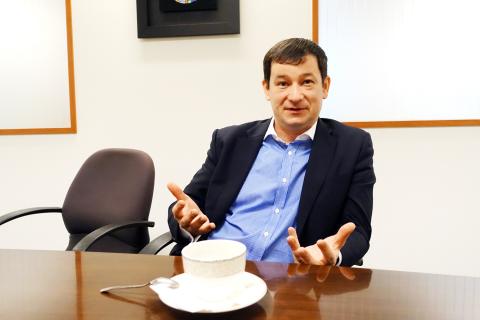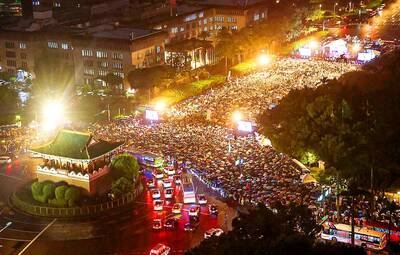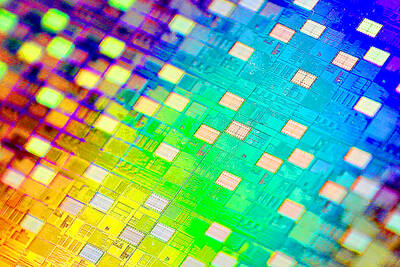Taipei Times (TT): Taiwanese generally have a poor knowledge of Russia. After serving as Moscow’s representative to Taipei for nearly a year, how do you propose to improve this?
Dmitrii Polianskii: Actually, in today’s world it is not a problem to get information about a certain country. Twenty years ago people were supposed to go to a library to learn something before traveling to a certain place. Now there are a lot of online resources and our small world has become much closer.
I think it is a two-way street. It is impossible to impose something on someone who has absolutely no interest in Russia. I feel that there is a growing attention toward my country in Taiwan, but most Taiwanese still think Russia is very far, logistics are very complicated and therefore rule out a trip to Russia or business cooperation with partners there.

Photo: Stacy Hsu, Taipei Times
Actually, this is not the case. Vladivostok, the biggest port in far eastern Russia, is only a four hour flight from Taipei — slightly farther than Seoul or Tokyo. Even Moscow and St Petersburg are only about 10 hours away — closer than any other European city. There aren’t any regular direct flights for the moment [only summer charter flights], but the connections are quite convenient and smooth.
Some people are even a little scared to go to such a big and virtually unknown country. A lot of things said about Russia in the media and published on the Internet are not true or not entirely correct. The reasons for that can vary from ignorance to intentional manipulation. To get a more or less unbiased picture of what is happening, people have to analyze different resources.
For those who are interested, we can provide any information or assistance. My colleagues and I try to meet as many people as we can — students, businessmen, artists and others, attend different presentations and seminars. We have a lot of information in English and Chinese at our Web site [www.mtc.org.tw], which we are going to upgrade soon, and on Facebook [www.facebook.com/mtcintaipei]. I am personally open to any questions about Russia — my twitter account [@taiwan_rus] is at your service. I consider that people-to-people contact is the best way to know each other and I have already made a lot of friends in Taiwan.
TT: The application process for a tourist visa to Russia is considered relatively costly and inconvenient. Do you have any plans to streamline the process to further boost the number of Taiwanese tourists to Moscow?
Polianskii: We do have plans to explore visa flexibility to make travel to Russia easier for tourists, students and businessmen. At the same time, even if you need to pay for a visa to Russia the overall cost of a journey there is quite reasonable and it is not complicated, especially for tourists applying through travel agencies.
In my opinion, if more Taiwanese tourists apply for visas to Russia it would be easier to promote visa facilitation schemes. Such an interest will also hopefully motivate airlines to launch direct flights to Russia. My contacts in major Russian airports indicate that Taiwanese carriers would be very welcome. Moscow is well-linked to most European airports so a connection there to some other destination could be very convenient.
TT: You mentioned in the No. 19 issue of the ‘Taiwan-Russia Magazine’ published a few months ago that you feel the interactions between Taipei and Moscow in economic, technological and scientific fields remain quite modest. How do you propose to increase our bilateral interaction or cooperation in these areas?
Polianskii: My compatriots already have a good knowledge of Taiwanese products. We know that Taiwan is a technologically advanced place and companies such as Asus, Acer, Transcend, BenQ and others have a very good market in Russia. Asus is considered to be the No. 1 computer brand in Russia. I think these companies really care about the Russian market and their successful experience could be a good motivation for others.
However, not only big companies, but also small and medium-sized enterprises could be involved in such cooperation. We are planning to launch an economic section of our Web site that would help to find partners in Russia. I would like to highlight that there are a lot of opportunities not only in Moscow and St Petersburg, but also in other regions of Russia.
In particular, I am really keen to promote the Russian Far East, which is very close to Taiwan and, through Vladivostok, is open to the whole Asia-Pacific region. Government and regional authorities are creating a lot of incentives for investors and entrepreneurs, special economic zones and advanced development territories are functioning to provide additional flexibility for those who want to start or expand businesses.
We will continue to organize exhibitions where Taiwanese partners are very welcome. The events schedule can be found on the Web sites of Russia’s biggest exhibitors like Expocentre [www.expocentr.ru/en/schedule/]. It is not about Taiwan giving something to Russia only in terms of technology or electronics. Naturally our cooperation should be a two way street and Russia can also offer a lot to Taiwan, not only oil, coal or natural gas. I particularly encourage Taiwanese businessmen to consider Russian suppliers of food products which are of good quality and might be quite cheap bearing in mind proximity of Vladivostok.
TT: After President Tsai Ing-wen (蔡英文) took office, some experts well-versed in Russian studies called on the president to look for other diplomatic opportunities other than just pushing for her ‘new southbound policy.’ However, given Russia’s strategic partnership with China, do you think it would limit the scope of bilateral cooperation between Moscow and Taipei?
Polianskii: I am not in a position to give any advice to Tsai, that would be most impolite. Besides, my mission is limited to economic, cultural and scientific issues. I do not see any constraints in our cooperation with Taiwan in these spheres, it is just a matter of choice and good-will of the two sides. We welcome any cooperation with Russia, our government promotes a lot of projects that might be interesting for Taiwanese businessmen.
Russia indeed pursues the “one China” policy and China is our biggest neighbor and strategic partner, but we are not the only country implementing this policy and it does not prevent Taiwan from developing ties with international partners, though maintaining good relations with China is equally important to all of them. Therefore, I do not think it should be a problem in the case of Russia.

The Central Weather Administration (CWA) today issued a "tsunami watch" alert after a magnitude 8.7 earthquake struck off the Kamchatka Peninsula in northeastern Russia earlier in the morning. The quake struck off the east coast of the Kamchatka Peninsula at 7:25am (Taiwan time) at a depth of about 19km, the CWA said, citing figures from the Pacific Tsunami Warning Center. The CWA's Seismological Center said preliminary assessments indicate that a tsunami could reach Taiwan's coastal areas by 1:18pm today. The CWA urged residents along the coast to stay alert and take necessary precautions as waves as high as 1m could hit the southeastern

FINAL COUNTDOWN: About 50,000 attended a pro-recall rally yesterday, while the KMT and the TPP plan to rally against the recall votes today Democracy activists, together with arts and education representatives, yesterday organized a motorcade, while thousands gathered on Ketagalan Boulevard in Taipei in the evening in support of tomorrow’s recall votes. Recall votes for 24 Chinese Nationalist Party (KMT) lawmakers and suspended Hsinchu City mayor Ann Kao (高虹安) are to be held tomorrow, while recall votes for seven other KMT lawmakers are scheduled for Aug. 23. The afternoon motorcade was led by the Spring Breeze Culture and Arts Foundation, the Tyzen Hsiao Foundation and the Friends of Lee Teng-hui Association, and was joined by delegates from the Taiwan Statebuilding Party and the Taiwan Solidarity

Instead of threatening tariffs on Taiwan-made chips, the US should try to reinforce cooperation with Taiwan on semiconductor development to take on challenges from the People’s Republic of China (PRC), a Taiwanese think tank said. The administration of US President Donald Trump has threatened to impose across-the-board import duties of 32 percent on Taiwan-made goods and levy a separate tariff on semiconductors, which Taiwan is hoping to avoid. The Research Institute for Democracy, Society, and Emerging Technology (DSET), a National Science and Technology Council think tank, said that US efforts should focus on containing China’s semiconductor rise rather than impairing Taiwan. “Without

The National Museum of Taiwan Literature is next month to hold an exhibition in Osaka, Japan, showcasing the rich and unique history of Taiwanese folklore and literature. The exhibition, which is to run from Aug. 10 to Aug. 20 at the city’s Central Public Hall, is part of the “We Taiwan” at Expo 2025 series, highlighting Taiwan’s cultural ties with the international community, National Museum of Taiwan Literature director Chen Ying-fang (陳瑩芳) said. Folklore and literature, among Taiwan’s richest cultural heritages, naturally deserve a central place in the global dialogue, Chen said. Taiwan’s folklore would be immediately apparent at the entrance of the